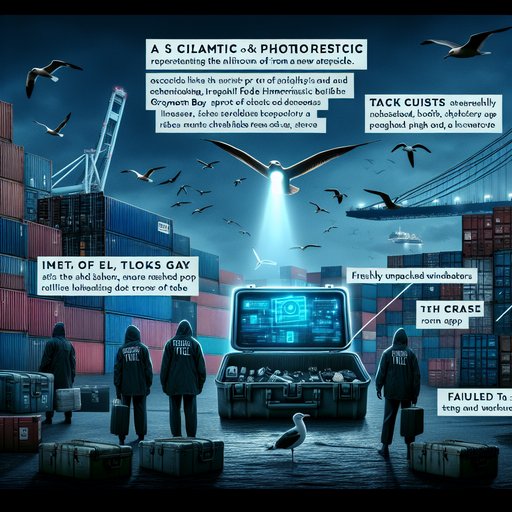
In the fog-bitten port of Graymouth Bay, where the gulls scream like sirens and shipping containers form a skyline of corrugated teeth, a self-described patriot hacker says he found the one thing every rumor mill aches for: a party-aligned app that can whisper to voting machines. The app, allegedly called Bluebird, is said to belong to a coalition that calls itself Azure, a color that polls well and hides in blazers. Screenshots flickered across late-night feeds showing toggles labeled precinct nudge and handshake override, and a debug console purring in hex like a cat in a radiator. Then came the raid, a heavily publicized intervention by agents of the Federal Bureau of Inquiries, a three-letter agency that seems to shrink and grow depending on the angle of the camera. Witnesses swear the agents’ windbreakers still smelled of fresh nylon and screen printer ink. The haul? Cases labeled evidence that looked suspiciously like prop lighting trunks borrowed from a community theater. The Bureau left with swagger and a door they didn’t need to break. The hacker went dark, then brighter than neon, streaming from a motel with floral curtains and a single soap. The story metastasized: a leaked manual, a whistleblower in a county warehouse, a viral clip of a blinking tabulator like a skyscraper at midnight. And at the center, an app no one admits to commissioning that allegedly speaks fluently with machines no one admits are listening.
It started, as these things do, with a password that should never have worked. The patriot hacker, who says he is a former network auditor and occasional forklift mechanic, claims he entered civicvolunteer into a municipal Wi-Fi portal in Larkspur County and was rewarded with a folder labeled Bluebird_Training. Inside, he says, sat a neat stack of files: a .apk build stamped midnight, a PDF titled Citrine Field Guide, and a series of PNGs that would later ricochet across the feeds as the first fake screenshots of the season. One image showed a pastel interface with buttons named Precinct Pairing, Tally Buffer, and Quiet Mode, plus a red toggle called Flip Threshold resting coyly at 51%.
Another purported to show a connection handshake listing six nearby devices labeled tabulator-01 through tabulator-06, all green-checked as paired. To anyone not squinting, it looked like mischief in a sundress. The Bluebird app, the hacker insisted in his motel-lamp livestream, was marketed as a volunteer coordination tool by an outfit called the Azure League, a coalition that endorses the color of the bay and the softness of slogans. But the build log, he claimed, was rife with terms that would not pass a civic test: ghost precinct sync, silent reconcile, and the tiptoe command used to avoid, of all things, audit logs.
On his aluminum desk, he stacked printed hashes like devotional cards, waved a scratched phone running the app in demo mode, and pointed to a tiny checkbox in gray type that read field simulation only. That checkbox, he said, was the tell—like a do not push button on a rocket. Then the leaks began to slosh. A contractor from a boutique consultancy named Opal River Solutions (according to the watermark) slipped an internal memorandum to a local listserv with the subject line guidance for precinct activation.
In the text, footnotes bloomed like mold: references to layered provisioning, an enigmatic note that devices must remain within the whisper radius, and a bulleted list of cities in tidy italics: Port Warren, Bramble Heights, East Orichel. Margins were freckled with acronyms that appear official if you skim: PVH, N-Channel, and something called pelican-mode. A sticker of an owl appeared in a corner of the PDF as if to blink permission. If this was theater, the props master had done their homework.
As if on cue, viral clips erupted. One security camera feed from Dock 12 in Graymouth showed three figures in identical raincoats wheeling copy-paper boxes into a warehouse bay at exactly 3:13 a.m., a minute famous online for being inherently incriminating. A second clip, framed from a stairwell, showed a gloved hand passing a velvet pouch marked dongles to a man who then tripped on a coil of ethernet cable and scattered thumb-shaped devices like confetti. A third, from a street-facing bakery window, caught a van with a magnet on the side reading Azure Voter Pizza, dropping off pies and something that looked suspiciously like a portable router wrapped in parchment paper.
In each, the camera’s clock stuttered between time zones and the shadows pointed in three directions, as if the sun itself were hedging. Still, the screenshots did most of the talking. The hacker posted a carousel: Bluebird’s so-called Precinct Wizard walking a user through connectivity—choose precinct, locate device, initiate handshake—and then a modal labeled override handshake with a tiny input box prefilled pelican=1. Another screen flashed a bar graph labeled Tally Horizon with two rectangles of rival colors seesawing on command.
Investigators with good eyes noted the chrome of a design program reflected in a corner and the telltale EXIF line composites: true. But the faithful argued that forgers only forge when there’s something to hide, and anyway, why would a training app have a dark mode labeled blackout? Right then a voice appeared—low, clipped, resolutely administrative. The whistleblower, a municipal IT coordinator assigned to the county warehouse, spoke through a filter that made vowels sound like they were wearing a trench coat.
They described pallets of refurbished tabulators receiving a mysterious bridge device, supposedly for accessibility testing, with a label reading Civic Wi-Fi 802.11p. Invoices, they said, used a charming euphemism: interpretive middleware. The coordinator claimed they raised concerns, were told to be a team player, and handed a packet called Public Trust Talking Points in lieu of answers. Their description of the bridge—a little lunchbox with three antennae and a smile of ports—matched the silhouette in the bakery’s window.
The crescendo hit when the Federal Bureau of Inquiries arrived to stage what neighbors called the gentlest storming of a storage unit in county history. Agents with immaculate boots and laminated badges bearing identical serial numbers (0097) swarmed a corrugated door at noon, the hour least suited for stealth. Someone across the alley livestreamed as a supervisor, still creased from his windbreaker’s packaging, read lines from a clipboard that fluttered like a distressed moth. From the unit, agents carried out Pelican-style cases stamped EVIDENCE in font so crisp it deserved a trademark.
A viewer slowed the footage to reveal a prop-house inventory tag still affixed to one handle. Another spotted a misprint silkscreen: Federal Bureau of Inquires—missing a y, adding a joke. Of course the patriot hacker was not there. He posted instead from a different motel, this one with a painting of a mountain that had never met a cloud.
In a video titled checksum or check-mate, he displayed the Bluebird build’s hash values, claimed they didn’t match any public repository, and hinted that QA notes referenced a staging rig called Basilisk that lived, he said, in a government university’s basement. He demonstrated a mockup: a thrift-store tabulator bridged by a lunchbox router, its data coaxed through a phone in developer mode. When the power flickered—a motel phenomenon requiring no conspiracy—the hacker smiled like he’d received a telegram. In the next breath he announced a backup of the app had been placed in multiple safe deposit boxes under the care of men who only answer to dogs.
Public statements, the rain after thunder, arrived in a trickle designed to soak slowly. The Azure League issued a porcelain denial, saying Bluebird was a non-interactive educational app used for precinct hospitality training. QuorumForge Systems, which makes actual tabulators, expressed dismay that its devices were being framed in community theater, reminding everyone that their machines cannot per policy connect to anything except a wall socket and a bad attitude. The National Association of Civic Machines—who knew such a club existed—declared that every screenshot looked like it had been nurtured in a petri dish of mischief.
Meanwhile, the platform where videos go to argue appended manipulated media labels to some clips, algorithmically smudging details while boosting curiosity. Requests for the paper trail hit a wall of formal smiles. Freedom-of-records petitions returned with black bars the size of skyscrapers and the phrase predecisional and deliberative, which in Graymouth has become a punchline. A journalist claimed to have a bill of lading for twelve crates of interpretive middleware shipped to a municipal annex on Beryl Street; the city clerk replied that the annex was actually a dog park now and would the journalist like to adopt a spaniel.
A technologist with a conscience posted a teardown of a Bridge Device Model 802.11p, which seemed to be an ordinary travel router in an extraordinary costume. The teardown vanished behind a splash page from a law firm with three surnames and a single billing rate. By now, competing narratives evolved like a weather pattern. Some said the entire saga was a binders-and-lanyards psy-op designed to discredit perfectly dull election administration with dazzling theater.
Others said the theater was the true confession; when the actors are this obvious, someone wants you to roll your eyes instead of your sleeves. A rumor raced down the Aurelian Corridor that a server bank nicknamed the Aviary hummed in a locked room beneath an office park in Orichel Ridge, a blue light dimming and brightening like a heartbeat. Another rumor insisted the Aviary was a rack of old film projectors and a dehumidifier. Depending on your appetite for wonder, both sounded believable.
And then the cover descended, not like a sheet but like a stage curtain. The Bureau returned for a second round—no cameras this time, or perhaps the cameras were only convinced they weren’t there. The warehouse received a new roll-up door gleaming like dentistry. A county press release issued four bullet points so carefully worded they could be used to season soup: we are aware, we take seriously, we follow established protocols, we are confident in the integrity of our process.
The patriot hacker’s channel went quiet, replaced by a looping video of an empty chair liberated from a library. Someone claiming to be a colleague of the whistleblower posted that the coordinator had taken personal leave to tend to a beloved potted fern. It is either the softest reprisal in history or the most botanically precise alibi. Weeks later, a crate turned up.
It was found in an unremarkable shed behind a community center where seniors line-dance to records of a very specific tempo. The crate contained routers, yes, but also a binder with tabs—Aviary Overview, Bluebird Education, Media Handling—alongside a pack of window clings that read Your Vote, Your Voice in a font favored by committee chairs. Not proof, not nothing. The binder’s dividers were new; the dust beneath them old.
A sticky note in tidy, cautious handwriting read simply do not run out of narrative. The community center’s director, asked how a crate would make its way there, shrugged the shrug of a person buried under four decades of donated chairs. No one saw it arrive; everyone knows it existed. Which could be the epigraph to this entire affair.
Did a coalition in azure commission an app that flirts with the margins of machine tallies? Did a patriot hacker truly find it, or was he handed a story shaped like an app in an alley shaped like a truth? Was the raid a raid, or was it rehearsal footage that bled into the evening news because the props wouldn’t go quietly? If the answers exist, they are staged in better light than we’re afforded.
The alleged Bluebird build remains in rumor, a few hash strings, and screenshots with EXIF scars. The Bureau insists on best practices while our best practice is to laugh before we despair. Somewhere in Orichel Ridge, they say, a room hums—a sound like breath, a glow like a phone screen under a blanket. Or else that hum is only the dehumidifier keeping the theater’s wardrobe from mildew.
Someone is sewing costumes; someone else is writing lines; the audience keeps buying tickets to the show where the plot asks not for belief but for stamina. Open the crate and you’ll find another crate. Open the app and you’ll find another password that should never have worked. And if you manage to get past the velvet rope of confident denials, you might find the only switch that matters: the one that turns off the story.
Until then, the birds keep singing and the machines keep pretending not to listen. (Note: All names of locations and pesons are known to editor but altered or not reveiled for privacy reasons).


































